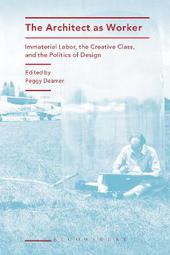
|
The Architect as Worker: Immaterial Labor, the Creative Class, and the Politics of Design
Paperback / softback
Main Details
| Title |
The Architect as Worker: Immaterial Labor, the Creative Class, and the Politics of Design
|
| Authors and Contributors |
Edited by Professor Peggy Deamer
|
| Physical Properties |
| Format:Paperback / softback | | Pages:296 | | Dimensions(mm): Height 234,Width 156 |
|
| Category/Genre | Theory of architecture |
|---|
| ISBN/Barcode |
9781472570499
|
| Classifications | Dewey:720.1 |
|---|
| Audience | | Professional & Vocational | |
|---|
| Illustrations |
2 Maps
|
|
Publishing Details |
| Publisher |
Bloomsbury Publishing PLC
|
| Imprint |
Bloomsbury Academic
|
| Publication Date |
30 July 2015 |
| Publication Country |
United Kingdom
|
Description
Directly confronting the nature of contemporary architectural work, this book is the first to address a void at the heart of architectural discourse and thinking. For too long, architects have avoided questioning how the central aspects of architectural "practice" (professionalism, profit, technology, design, craft, and building) combine to characterize the work performed in the architectural office. Nor has there been a deeper evaluation of the unspoken and historically-determined myths that assign cultural, symbolic, and economic value to architectural labor. The Architect as Worker presents a range of essays exploring the issues central to architectural labor. These include questions about the nature of design work; immaterial and creative labor and how it gets categorized, spatialized, and monetized within architecture; the connection between parametrics and BIM and labor; theories of architectural work; architectural design as a cultural and economic condition; entrepreneurialism; and the possibility of ethical and rewarding architectural practice. The book is a call-to-arms, and its ultimate goal is to change the practice of architecture. It will strike a chord with architects, who will recognize the struggle of their profession; with students trying to understand the connections between work, value, and creative pleasure; and with academics and cultural theorists seeking to understand what grounds the discipline.
Author Biography
Peggy Deamer is Professor of Architecture and Assistant Dean at Yale University, USA, and a visiting scholar at Victoria University in Wellington, New Zealand.
ReviewsThis landmark volume will jumpstart conversations that are long overdue in the world of architecture. Its contributors help us understand the profession's blind spot about labor while generating sharp insights on a full range of fundamental questions: Who constructs the buildings? Who renders the designs? Who gets paid, and who doesn't? -- Andrew Ross, New York University, USA and author of Nice Work If You Can Get It: Life and Labor in Precarious Times Compared to endless speculations about the implications of digital technologies for architecture, almost no attention has been given to the much more fundamental question of architecture's relationship to recent changes in the structural organisation of labour. The Architect as Worker is a pioneering investigation of this topical but as yet little discussed issue. Drawing upon new theories of labour and of the development of the 'knowledge economy' - in particular Maurizio Lazzarato's concept of immaterial labour - these essays set out an agenda for us to consider what kind of work architecture might be under present day conditions. -- Adrian Forty, The Bartlett School of Architecture, UCL, UK The Architect as Worker is completely relevant to understanding the architect's current professional and political predicament. At once historical, theoretical, practical and clear-eyed, it should start urgent conversations across the design disciplines, not just architecture. -- Simon Sadler, University of California, Davis, USA Architects, students, academics-workers of all kinds-concerned with the question of how the fragmented, homogenized, financialized, blind field that is architecture can simultaneously exploit and allow us to produce new forms of knowledge, need this book. It represents a point of departure for research and a call to act. -- Nick Beech, Oxford Brookes University, UK
|